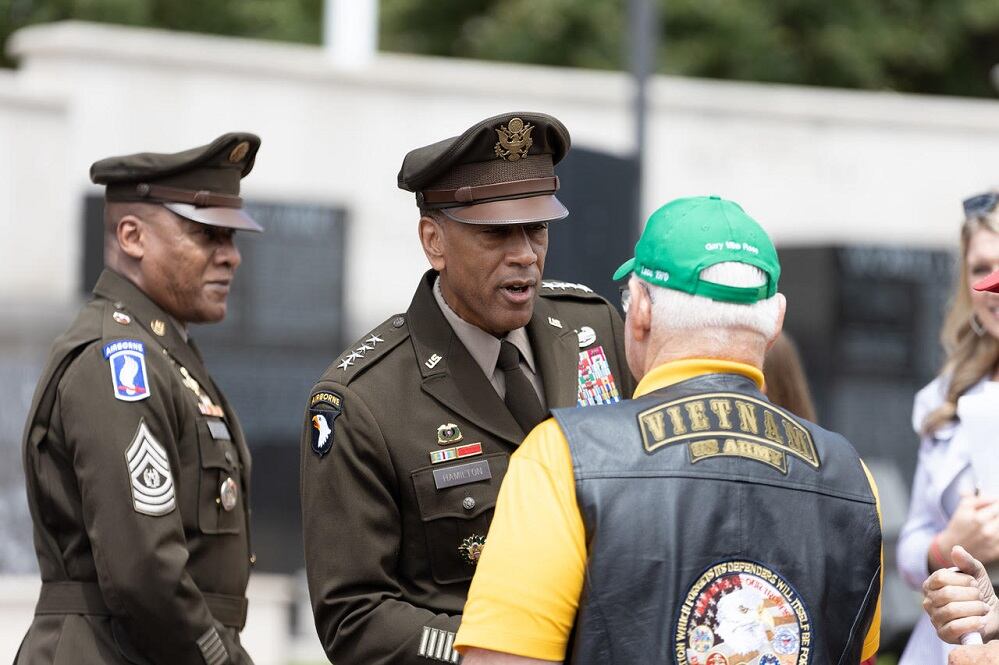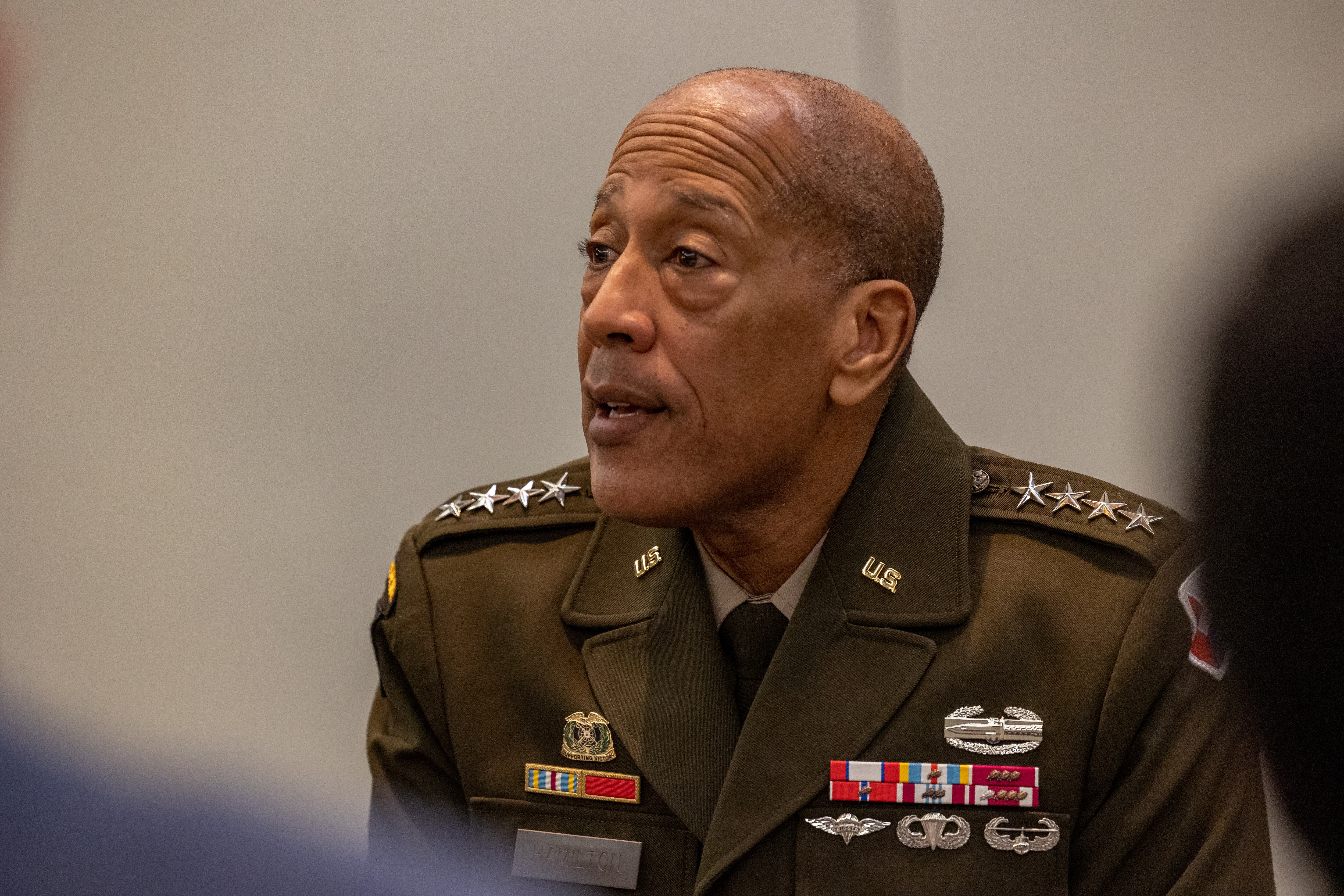Secretary of the Army Christine Wormuth has fired a four-star general over his alleged inappropriate involvement in a subordinate’s command assessment board.
Wormuth fired former head of Army Materiel Command Gen. Charles R. Hamilton on Tuesday. Military.com was first to report the four-star’s dismissal.
“Based on the findings of a Department of the Army Inspector General investigation, the secretary of the Army has relieved Gen. Charles Hamilton of command,” Army spokeswoman Cynthia O. Smith wrote in a statement to Army Times.
“The current acting commander of Army Materiel Command, Lt. Gen. Chris Mohan, will continue in this role pending the nomination of a permanent replacement to serve as the commander.”
Wormuth suspended Hamilton earlier this year after officials found “credible allegations” that he had improperly influenced a former subordinate’s command assignment, Army Times reported.
Hamilton is one of only about a dozen four-star generals in the Army.
The last Army four-star general fired for misconduct was Gen. Kevin Byrnes, who in 2005, as the head of the service’s Training and Doctrine Command, was dismissed over an extramarital affair.
Gen. Stanley McChrystal resigned in 2010 after a Rolling Stone article published comments from McChrystal and senior aides that were critical of then-Vice President Joe Biden and other officials in President Barack Obama’s administration.
Hamilton, meanwhile, maintains he did not improperly interfere in the command selection process for a lieutenant colonel.
“It was my honor to serve our nation, and I’ve been blessed beyond what I’ve deserved to lead our troops for the past 43 years,” Hamilton told Military.com. “While I wish I was able to complete my command, we all take the uniform off and we don’t always control the timing. I look forward to continuing to serve our nation in new ways.”
Reporting by Military.com in March preceded the Army Inspector General investigation that ultimately resulted in Hamilton’s firing.
The secretary’s spokeswoman, Col. Randee Farrell, told Army Times in March that Wormuth first learned of the allegations against Hamilton from that report.
Hamilton’s former subordinate, who was not punished because of this incident, twice failed Battalion Commander Assessment Program, or BCAP, panels in 2023.
But the four-star general spent about a month lobbying for the lieutenant colonel, despite deficient performance on the new command selection boards. The lobbying began before her board, when Hamilton made references to panel judges — a trio of two-star generals — that he knew the lieutenant colonel they would be reviewing.
Hamilton also reached out to an adviser at the Army Talent Management Task Force and the head of the Army’s BCAP for documents related to the lieutenant colonel’s assessment.
That lobbying was intense enough that Col. Robert O’Brien, head of the Army’s Command Assessment Program, wrote a memo detailing Hamilton’s effort, Military.com reported.
Both Hamilton and the former subordinate are Black, which Hamilton said has been a factor in mentoring the officer. In an Aug. 16, 2024, letter that he wrote to Wormuth about the battalion commander selection process, he said the new command selection method “fails to account for the psychological effects that systemic bias, discrimination, and overt racism can have on prospective officers.”
The BCAP, which the Army kicked off in 2020, seeks to better evaluate battalion commander candidates through a “blind board” in which senior officers review the candidate with a sergeant major providing input to the panel.
The “blind” reference, meanwhile, is quite literal, with the candidate standing on the opposite side of a hanging sheet during the panel and background paperwork. Additionally, the board is unable to see personally identifying information.
Of the more than 800 who both qualified for and sought a battalion commander position in 2020, about 450 were placed on primary list for commands.
In his letter to Wormuth, Hamilton wrote that steps taken to create unbiased boards did not go far enough.
“Removing photographs from personnel files and providing unconscious bias training for panelists is not enough,” Hamilton wrote, according to reporting by Task & Purpose. “By the time a Minority officer sits before a Command Assessment Program panel, the bias and racism that exists in our Army culture is already cemented into evaluation reports, peer assessments, and opinions of decision makers.”
Hamilton also said he had been open about advocating for his former subordinate, despite the consequences.
“Regardless of what decision you make regarding my fate, I implore you to investigate why the Command Assessment Program deems so few Minority officers as ready for command and what barriers exist that make qualified Black officers unwilling to subject themselves to that process,” Hamilton wrote.

In Hamilton’s case, there will be a review — not necessarily because of Hamilton’s input but more likely due to actions that could have improperly influenced the assessment.
“Although the investigation found that the Command Assessment Program withstood an attempt to interfere with its process,” Smith wrote, “Secretary Wormuth will be issuing a directive that formally establishes CAP as an enduring Army program in order to reinforce the integrity of CAP and increase transparency.”
The same inspector general’s report that led to Hamilton’s firing also noted that Hamilton took his lobbying efforts to Army Chief of Staff Gen. Randy George and Lt. Gen. Walter Piatt, then vice chief of staff.
The report dinged the pair for not asking Hamilton more about why he was trying to influence his subordinate’s command selection.
But Hamilton didn’t tell the pair that he had only observed the lieutenant colonel’s interview. He also didn’t tell them that both panels found the officer unfit for command, or that he had contacted members of the command selection panel, according to the investigation.
Hamilton enlisted in the Army out of his hometown of Houston, Texas, in 1981.
Seven years later, in 1988, he earned his commission in the Quartermaster Corps following Officer Candidate School, where he was the distinguished military graduate.
He previously served as Army deputy chief of staff for logistics before taking the helm at Army Materiel Command in March 2023.
Hamilton’s awards include the Distinguished Service Medal, two Defense Superior Service Medals, four Legions of Merit and two Bronze Star Medals, according to his official biography.
He held command three times in Afghanistan.
Todd South has written about crime, courts, government and the military for multiple publications since 2004 and was named a 2014 Pulitzer finalist for a co-written project on witness intimidation. Todd is a Marine veteran of the Iraq War.




